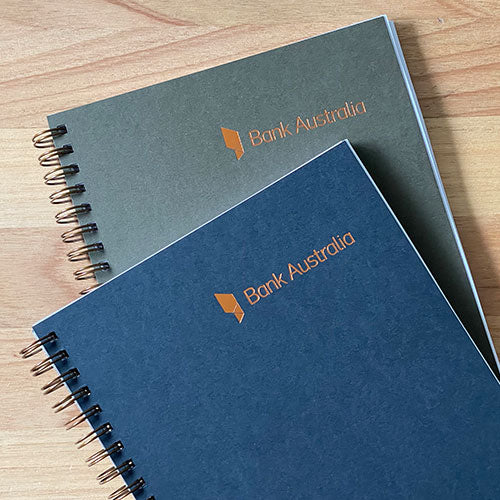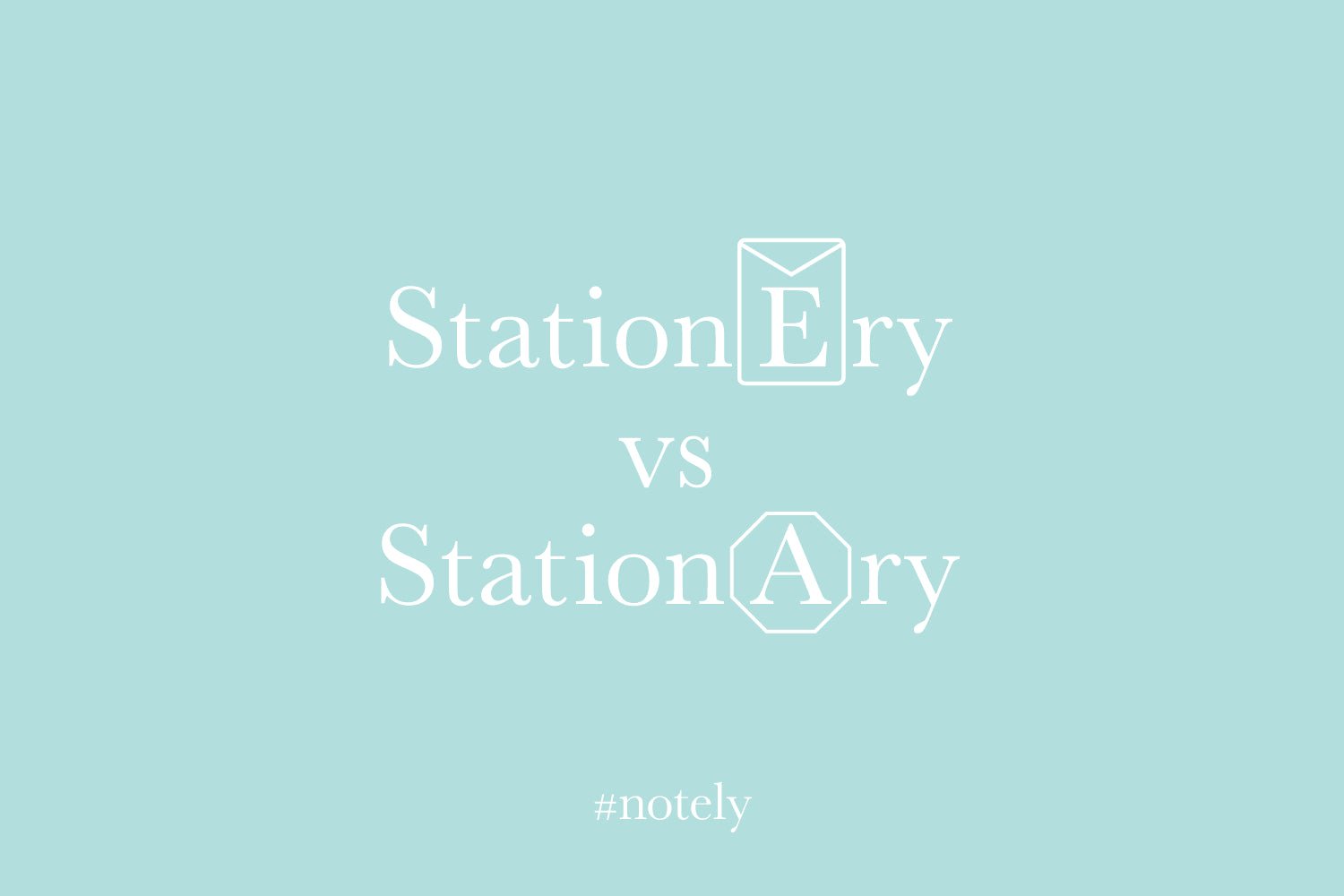Ever been stumped by the choice between 'stationery' and 'stationary'? Don't worry, you're not alone. These words are often confused, but they have different meanings. Let's settle the stationery vs stationary debate once and for all!
The answer lies in their spelling – just one letter apart. A tiny difference that can alter your message completely!
We're here to help navigate which is which and give practical advice to get it right every time.
Stationery vs Stationary: understanding the difference
Many people find the words 'stationery' and 'stationary' perplexing, so they are not alone. These two terms are often mixed up, but they actually have quite different meanings.
The meaning of stationery
'Stationery', with an 'e', refers to items used for writing or correspondence, like paper, pens, envelopes and cards. A useful tip to remember this is thinking of 'e' for envelope. This term dates back to stationers in the 18th century who sold these items from a fixed spot – hence they were 'stationed'.
Notely offers a wide array of journals, notebooks, wall planners, and cards as part of their eco-friendly stationery collection. Each piece has been thoughtfully designed in Australia using sustainable materials that help us do good by replanting our planet, one note at a time.

The meaning of stationary
On the other hand, 'stationary', spelled with an 'a', means not moving or standing still. It can refer to anything from your car parked on a street corner (a stationary vehicle) to your heart rate during meditation.
Common mistakes and how to avoid them
Mixing up these two words is easy if you're rushing through an email, jotting down notes, or even if autocorrect takes over! But getting it right shows attention to detail – crucial whether we’re talking personal journal entries or professional emails.
If you need help, remember stationery with an 'e' for envelope (and all the other lovely items in Notely's stationery collection), while 'a' stands for not moving an inch or I remained stationary.
The meaning of stationery
What does the term 'stationery' actually signify? At its core, stationery refers to a wide range of writing materials. These can include items like paper, pens and pencils, envelopes – basically anything you might need for written communication.
Think back to your school days or even your current office desk; chances are they're filled with various types of stationery. But this is where confusion often sets in because there's another word that sounds just like it: 'stationary'. Remembering that 'e' stands for envelope will help you with the correct spelling.
Australia-based Notely has an impressive collection of eco-friendly journals, which perfectly exemplify what stationery is all about. They’re designed for capturing thoughts, dreams and plans on sustainable paper – making every note count while caring for our planet.
Notely's stationery collection
If you didn't know already, we're passionate stationery lovers here at Notely! Journals and notebooks are the backbone of any stationery collection and hold a special place in our hearts. Whether you're jotting down daily musings or planning your next big project, these companions are crafted for durability while reducing environmental impact.
Made with a mix of 100% post-consumer waste and FSC-certified papers, we're keen to have as little impact on the planet as possible. Learn more about our sustainability and our mission.
The meaning of stationary
Ever stood still, watching the world rush by? That's you being 'stationary'. Derived from the Latin word 'stationarius', it means unmoving or not changing.
'Stationary', a common term we often confuse with its sound-alike cousin Notely stationery. But here’s how to remember: think ‘ar’ for ‘at rest’. Easy as pie.
Everyday uses of stationary
In our everyday lives, the term 'stationary' is something we employ more than you'd think. For example, when your car is parked and not moving, it's stationary. Even when you're meditating in one spot without any movement – yep. You guessed right – that's also called being stationary. Remember when you remain stationary, it's about standing still, not moving, or being frozen in time!
Sometimes it pops up in unexpected places too. Ever heard of a 'stationary bike'? It doesn't go anywhere but sure gets your heart racing.
Science behind stationary
You might be surprised to learn that this simple word carries weight even in scientific circles. In physics and statistics alike, something referred to as 'stationarity' implies no change over time.
This idea has significant implications across fields like meteorology (weather patterns), finance (stock prices), and environmental science (pollution levels).
Mix-ups with Notey stationery
We all make mistakes! And confusing “Notey stationery”, beautiful eco-friendly products designed to jot down thoughts and ideas on paper with 'Stationary', a state of being still, is one such common mix-up.
Remember this simple tip: ‘e’ for envelope and 'ar' for at rest. Keep these in mind next time you're writing an email or journaling in your Notely notebook, and I bet you won't get tripped up again.
A little bit of stationary humour
What did the stationary say to the paper? 'You move me.' Or, have you heard, 'No matter how much you push the envelope, it'll still be stationery.'
If you're a stationery nerd, you might enjoy these stationery puns. Alright, let's carry on with our day, shall we?
‘e’ for envelope and 'ar' for at rest. Keep these in mind next time you're writing an email or journaling in your Notely notebook and I bet you won't get tripped up again.
Mistake 1: Using Stationary instead of Stationery
This blunder transpires frequently. You might write 'I bought some lovely stationary from Notely', when what you really mean is stationEry – pens and notebooks galore. The trick? Think about the ’e’ in envelopEs; they’re part of your stationEry set.

Mistake 2: Misspelling Stationery Items
Avoiding typos goes beyond just swapping out letters. Make sure every word is spelled correctly – especially those relating to our products. Whether it's jotting down thoughts in our journals, making plans on our wall planners or sending notes using our cards, spelling matters.
Mistake 3: Confusing Their Applications
Remember this rule of thumb – if it involves writing tools like those found among Notely’s beautiful collections (including journals or wall planners), then we are talking about stationErY. If something isn’t moving or changing state- think “stAying stAtionAry”.
Impact of using correct terms on professionalism
Language matters. The words we use, especially in professional settings, have a powerful impact. It's more than just good grammar or proper spelling; it reflects our attention to detail and respect for communication.
Notely's stationery collection, with its exquisite journals and cards, stands as a testament to the importance of using correct terms like 'stationery'. But what happens when you mix up 'stationery' with 'stationary'?
Mix-ups affect perception
The term 'stationery' refers to items used in writing like pens, paper or envelopes while 'stationary' means unmoving. Mixing them up might seem harmless but could make others question your professionalism.
In fact, these small errors can subtly alter how colleagues or clients perceive us – often without us even realising. This is particularly true if you're communicating through written mediums such as emails where first impressions matter most. We're all guilty of it and technology is definitely making most of us lazier in the writing department!
Your words reflect your brand
Your brand’s reputation isn’t just about quality products; it also includes every interaction you have with customers. If someone reads an email from Notely mentioning 'beautiful stationary', they'll likely get confused: Is Notely selling immovable objects now? By being mindful about language usage — remembering that ‘e’ stands for envelope when thinking of stationery (and of course, Notely, for all of your sustainable office supplies).
A Boost To Confidence And Credibility
Surely enough there are spell-checkers out there. However not all similar-sounding words (like stationEry/stationAry) will be flagged by these tools, so knowing the correct term boosts your confidence. When you use language accurately and effectively, it adds credibility to your professional image.
So next time when you write an email or create a proposal, the word 'stationary' has a very different mean to 'stationery'. Not only does it reflect on your professionalism but also impacts how others perceive you.
your work. When you nail down those tricky words, it shows your commitment to precision and excellence. It's more than just getting the spelling right; it’s about presenting yourself as a true professional. Keep this in mind when writing that next email or report – accuracy boosts confidence, adds credibility and ultimately strengthens your personal brand.
Conclusion
By now, you should know your pens from your parking spots. We've untangled the web of 'stationery vs stationary'.
You've dived into their distinct meanings and origins. Explored Notely's lush stationery collection that adds a touch of class to everyday scribbles.
We've pointed out common mistakes and given tips on how to dodge them. Remember, correct usage can boost your professionalism sky-high!
So go forth with confidence in using these terms right! Give it a whirl next time you pen down something or discuss movement (or lack thereof).
Your language has power; use it wisely.
If ever in doubt between 'stationery' and 'stationary', remember… 'e' for envelope!

![Spearmint A6 Pocket Notebooks [BULK 8 PACK] - Notely Lined](http://notely.com.au/cdn/shop/products/spearmint-a6-pocket-notebooks-bulk-8-pack-notely-399099_1600x.jpg?v=1699275130)








